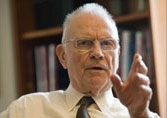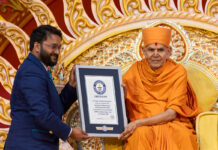
I have been involved in politics and policy-making for over 50 years, and as you can imagine I hold strong feelings about reporters and the media. They’re not what you might think, however.
Far from considering journalists to be irritating pains in the neck – though I’ve known a few who qualified – I believe them to be indispensable to our democracy. Our system rests on citizens’ ability to make discriminating judgments about policies and politicians. Without the news, information, and analysis that the media provides, this would be impossible.
So I am uneasy about some of the directions I see journalism taking these days. Reporters often seem to take what politicians and their handlers say at face value. They look for winners and losers at the expense of nuance. They strive to give the appearance of even-handedness by creating a false balance between two sides that do not deserve equal weight. They elevate politics, polls and personality over substance and measured analysis.
They slant the news. They engage in pack journalism. And they delight in spotlighting screw-ups, which might be entertaining to readers but shed no light on the underlying issues that could make government better if addressed.
I also worry about the increasingly sophisticated efforts by the government and powerful interests to tell us only what they want us to know. The White House in particular – under Presidents of both parties – has become quite skillful at manipulating the press.
I believe that much contemporary journalism has come untethered from a set of traditional values that served the country well over many years:
• Journalism needs to be in the service of justice, asking questions, telling stories, and inspiring those in power and those who vote for them to do the right thing.
• It should be a check on power.
• It must hold tight to accuracy, intellectual honesty, rigorous reporting, and fairness.
• And journalists have a profound responsibility to serve as lie detectors. Journalists have to be curious and skeptical and not buy into the conventional wisdom of the establishment.
In the end, my concern is that skeptical reporting and deeply informed investigative journalism are fading. We need more of them, not less. I want to see journalists digging deep into the activities of government, politics, business, finance, education, welfare, culture, and sports. Our Republic depends on it.
Lee Hamilton is Director of the Center on Congress at Indiana University; Distinguished Scholar, IU School of Global and International Studies; and Professor of Practice, IU School of Public and Environmental Affairs. He was a member of the U.S. House of Representatives for 34 years.
Lee H. Hamilton






